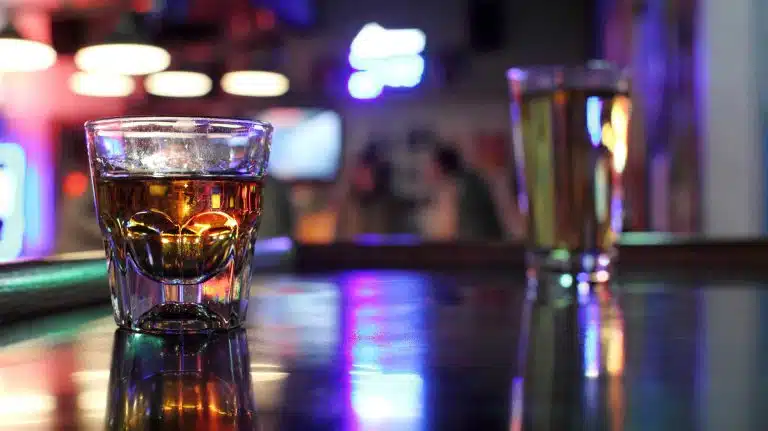Alcohol is among the most popular drugs in the world, and two of the most well-known types of alcohol are hard liquor and beer.
Both types pose serious health risks. However, they also have some important differences.
Hard Liquor
Hard liquor is also called hard alcohol. The main types of hard liquor include:
- brandy
- gin
- tequila
- vodka
- whiskey
Each type of hard liquor is distilled. That means it’s heated to create a vapor and then condensed back into a liquid. This process gets rid of excess water, which increases the drink’s alcohol content (also called alcohol concentration). The alcohol content is measured in alcohol by volume (ABV).
Standard Drink Size
According to the National Institute on Alcohol Abuse and Alcoholism (NIAAA), a standard serving size of hard liquor is 1.5 ounces, which has about 40% ABV.
Safety Risks
People tend to consume hard liquor more quickly than they consume other alcoholic drinks. That’s because hard liquors are often used in mixed drinks.
Mixed drinks include mixers (such as sweeteners and flavorings) that hide the taste of alcohol, which encourages faster alcohol consumption.
Also, many people drink hard liquor in shot form. A shot is a small serving of alcohol. Often, a person will take a large number of shots within a few minutes.
When you consume a large amount of alcohol in a short amount of time, you face a high risk of alcohol poisoning. Common signs of alcohol poisoning include:
- confusion
- vomiting
- slow heart rate
- slow or irregular breathing
- pale, bluish, or clammy skin
- seizures
- sudden drop in body temperature
- loss of consciousness
If you or someone you know experiences these symptoms, seek medical attention right away. When left untreated, alcohol poisoning can be fatal.
In addition, because hard liquor impairs your judgment, it makes you more likely to engage in dangerous behaviors.
For example, you might drive while drunk and cause a car crash. You may also engage in risky sexual behaviors that can lead to sexually transmitted diseases and unwanted pregnancy.
Health Concerns
Regularly drinking hard liquor can lead to alcohol use disorder. Also called alcohol addiction, this disease makes you feel unable to control your alcohol use. Common signs of alcohol use disorder include:
- tolerance, which means you need increasingly larger or more frequent drinks to feel the desired effects
- physical dependence, which means you experience withdrawal symptoms (such as nausea or anxiety) when you don’t drink
- loss of interest in activities once enjoyed
- mood swings
- decline in personal hygiene
Long-term use of hard liquor can also have other health effects, including:
- high blood pressure
- heart disease
- heart attack
- stroke
- liver disease
- digestive problems
- cancer of the breast, mouth, throat, esophagus, voice box, liver, colon, and rectum
- mental health problems like depression and anxiety
- memory problems like dementia
- weakened immune system
In addition, although hard liquor is sugar-free and carbohydrate-free, it’s often mixed with mixers that contain a significant amount of added sugar and carbs. Consuming too much of these substances increases your risk of health problems such as:
- high blood pressure
- inflammation
- fatty liver disease
- heart attack
- stroke
Beer
Made from cereal grains, beer is one of the oldest alcoholic beverages in the world. Unlike hard liquor, beer isn’t distilled. That means it has a lower alcohol content.
Standard Drink Size
The standard serving size of beer is 12 ounces, which has about 5% ABV.
Safety Risks
Although beer contains less alcohol than hard liquor, it can still cause alcohol poisoning, especially if you engage in binge drinking. Binge drinking occurs when a woman has four or more drinks in about two hours and a man has five or more drinks in about two hours.
Also, like drinking hard liquor, drinking beer impairs your judgment and increases your risk of dangerous behavior.
Health Concerns
People who drink beer face the same health risks as those who drink hard liquor, including:
- alcohol use disorder
- heart disease
- liver disease
- certain cancers
- mental health and memory problems
Beer lacks the added sugar found in mixed drinks. However, it has more carbs than hard liquor without mixers. While hard liquor without mixers has zero carbs, regular beer has about 13 grams of carbs, and light beer has about 6 grams of carbs.
If you or someone you love struggles with alcohol use, please reach out to an Ark Behavioral Health specialist. Our substance abuse treatment centers offer medical detox, mental health counseling, and other recovery-focused services.
Written by Ark Behavioral Health Editorial Team
©2024 Ark National Holdings, LLC. | All Rights Reserved.
This page does not provide medical advice.
Centers for Disease Control and Prevention - Drinking too much alcohol can harm your health
Harvard Health Publishing - The sweet danger of sugar
National Institute on Alcohol Abuse and Alcoholism - Understanding the Dangers of Alcohol Overdose
National Institute on Alcohol Abuse and Alcoholism - What Is A Standard Drink?
Questions About Treatment?
Ark Behavioral Health offers 100% confidential substance abuse assessment and treatment placement tailored to your individual needs. Achieve long-term recovery.
100% confidential. We respect your privacy.
Prefer Texting?
Our friendly support team is here to chat 24/7. Opt out any time.








 Learn More
Learn More








